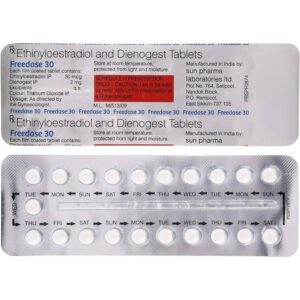ETHINYL ESTRADIOL + DIENOGEST
Ethinyl Estradiol: Ethinyl Estradiol, commonly known as EE, is a synthetic form of the hormone estrogen. It is primarily used as a component of various hormonal contraceptives, including combined oral contraceptive pills, contraceptive patches, and vaginal rings.
EE works by inhibiting ovulation through its suppression of the release of luteinizing hormone (LH) and follicle-stimulating hormone (FSH) from the pituitary gland. Additionally, it thickens the cervical mucus, making it more difficult for sperm to reach the uterus. EE also alters the lining of the uterus, making it less suitable for the implantation of a fertilized egg.
The dose of EE may vary depending on the specific contraceptive product being used. It is often combined with a progestin hormone in fixed doses, and the dosage can range from 20 to 50 micrograms per day.
While EE is generally safe and well-tolerated, it can cause some side effects. Common side effects include nausea, breast tenderness, headache, bloating, and mood changes. Some women may also experience breakthrough bleeding, changes in appetite, weight gain, or changes in libido while taking EE.
It is important to note that EE carries some risks, including an increased risk of blood clots, stroke, and certain types of cancer. It is not recommended for smokers, individuals with a history of blood clots or certain cancers, or those with uncontrolled high blood pressure.
Overall, Ethinyl Estradiol is an effective and commonly used synthetic estrogen that is primarily used in combination with a progestin as a contraceptive method. It is important to consult with a healthcare professional for personalized advice and information regarding the appropriate use of EE.
Dienogest: Dienogest is a progestin medication primarily used for the treatment of endometriosis, a condition where the tissue lining the uterus grows outside of it. It is available in tablet form and is taken orally.
The exact mechanism of action of Dienogest is not fully understood. However, it is believed to work by suppressing the growth of the endometrial tissue and reducing the production of estrogen, thereby relieving the symptoms associated with endometriosis, such as pelvic pain and menstrual irregularities.
The usual recommended dose of Dienogest for the treatment of endometriosis is 2 mg per day. It should be taken at the same time each day, with or without food. It is important to follow the prescribed dosage and duration as directed by your healthcare provider.
Like any medication, Dienogest may have side effects. Common side effects include headache, nausea, breast tenderness or pain, mood changes, decreased libido, and irregular vaginal bleeding. These side effects are usually mild and temporary. However, if you experience severe or persistent side effects, it is crucial to inform your doctor.
Some rare but potentially serious side effects of Dienogest include blood clots, liver problems, and allergic reactions. Seek immediate medical attention if you experience symptoms such as severe pain or swelling in the calf, sudden shortness of breath, yellowing of the skin or eyes, dark urine, or severe allergic reactions like rash, itching, or swelling.
It is important to note that Dienogest should not be used in pregnancy or in combination with certain medications. It may interact with medications that affect liver enzymes, such as those used to treat epilepsy or HIV. It is always advisable to inform your healthcare provider about all the medications you are taking before starting Dienogest.
Overall, Dienogest is an effective medication for the treatment of endometriosis. It should be used under the guidance of a healthcare professional, and any concerns or questions should be discussed with them.

